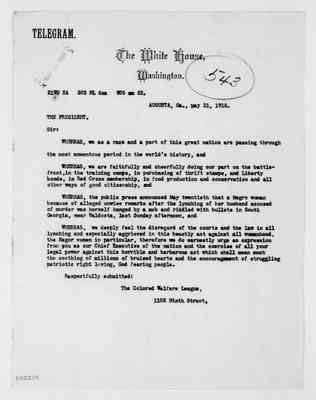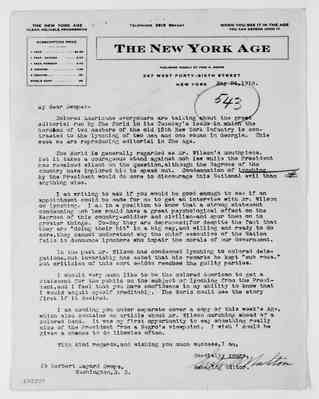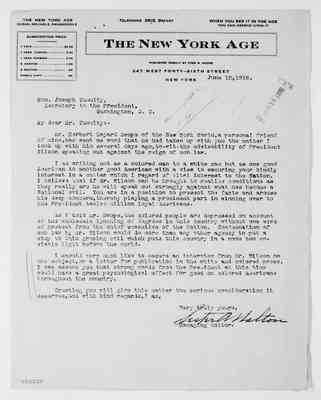Pages
1005
Plainfield, N. J., March 5, 1918.
Honorable Woodrow Wilson, Washington, D. C.
To the President, Sir:-
I address these lines to you because of my high opinion of your vision and justice.
When I was a boy, the colored people of our country would have stood by the flag up to their necks in blood, and I am convinced they will do so at this time. The reckless and cruel lynchings going on, often for minor offences, and in some cases of innocent men, have chilled their hearts and caused them to stand in fear and treabling concerning the future. The colored people do not wish to defend the guilty, and are willing and anxious that punishment should be meted out after due process of law. Lynch law is a lack of confidence in courts of justice, and its ultimate result will be a lowering of the social standard of those who practise it - which is true in Pennaylvania, at historic Brandy-Wine as anywhere.
It will, indeed, be appreciated if you will give this subject your Kindly and always patrictic thought._ and say a word to the countiiy
Sincerely yours,
Charles Stewart Sminck. CSS/V
838 East Front St.
152227
1006
2IWU XA 202 NL 6xn 905 . 22.
AUGUSTA, Ga., May 21, 1918.
THE PRESIDENT.
Sir:
WHEREAS, we as a race and a part of this great nation are passing through the most momentous period in the world's history, and
WHEREAS, we are faithfully and cheerfully doing our part on the battle front, in the training camps, in purchasing of thrift stamps, and Liberty bonds, in Red Cross membership, in food production and conservation and all other ways of good citizenship, and
WHEREAS, the public press announced May twentieth that a Negro woman because of alleged unwise remarks after the lynching of her husband accused of murder was herself hanged by a mob and riddled with bullets in South Goorgia, near Valdosta, last Sunday afternoon, and
WHEREAS, we deeply feel the disregard of the courts and the law in all lynching and especially aggrieved in this beastly act against all womanhood, the Negro women in particular, therefore we de earnestly urge an expression from you as our Chief Executive of the nation and the exercise of all your legal power against this horrible and barbarous act which shall mean much the soothing of millions of bruised hearts and the encouragement of struggling patriotic right loving, God fearing people.
Respectfully submitted: The Colored Welfare League, 1102 Ninth Street,
152228
1007
May 24, 1918.
My dear Swope:—
Colored Americans everywhere are talking about the great editorial run by The World in its Tuesday's issue in which the heroism of two members of the old 15th New York Infantry is contrasted to the lynching of two men and one woman in Georgia. This week we are reproducing editorial in The Age.
The World is generally regarded as Mr. Wilson’s mouthpiece. Yet it takes a courageous stand against mob law while the President has remained silent on the question, although the Negroes of the country have inplored hin to speak out. Condemnation of lynching by the President would do more to discourage this national evil than anything else.
I an writing to ask if you would be good ehough to see if an appointment could be made for me to get an interview with Mr. Wilson on lynching. I am in a position to know that a strong statement condemning mob law would have a great psychological effect on the Negroes of this country - soldier and civilian - and spur them on to greater things. To-day they are depressed; for despite the fact that they are "doing their bit" in a big way, and willing and ready to do more, they cannot understand why the chief executive of the nation fails to denounce lynchers who impair the morale of our governnent.
In the past Mr. Wilson has condemned lynching to colored delegations, but invariably has asked that his remarks be kept "sub rosa." But criticisn of this sort seldon reaches the guilty parties.
I should very much like to be the colored American to get a statement for the public on the subject of lynching from the President, and I feel that you have confidence in my ability to know that I would acquit myself creditably. The World could use the story first if it desired.
I am sending you under separate cover a copy of this week's Age. which also contains an article about Mr. Wilson marching ahead of a colored band. It was my first opportunity to say something really nice of the President from a Negro's viewpoint. I wish I could be given a chance to do likewise often.
With kind regards, and wishing you much success, I am,
Cordially yours, Lester A. Walton Managing Editor.
To Herbert Bayard Swope, Washington, D. C.
152229
1008
June 12,1918.
Hon. Joseph Tumulty, Secretary to the President, Washington, D. C.
My dear Mr. Tumulty:
Mr. Herbert Bayard Swope of the New York World, a personal friend of mine, has sent me word that he had taken up with you the matter I took up with him several days ago, to-wit-the advisability of President Wilson speaking out against the reign of mob law.
I am writing not as a colored man to a white man but as one good American to another good American with a view to securing your kindly interest in a matter which I regard of vital interest to the Nation. I believe that if Mr. Wilson can be brought to realize conditions as they really are he will speak out strongly against what has become a national evil. You are in a position to present the facts and arouse his deep concern, thereby playing a prominent part in winning over to the President twelve million loyal Anericans.
As I told Mr. Swope, the colored people are depressed on account of the wholesale lynching of Negroes in this country without one word of protest from the chief executive of the nation. Condemnation of mob law by Mr. Wilson would do more than any other agency to put a stop to this growing evil which puts this country in a none too enviable light before the world.
I should very much like to secure an interview from Mr. Wilson on the subject, or a letter for publication in the white and colored press. I can assure you that strong words from the President at this tine would have a great paychological effect for good on colored Americans throughout the country.
Trusting you will give this matter the serious consideration it deserves, and with kind regards, I am,
Very truly yours, Lester A. Walton Managing Editor.
152230
1009
Mr. Swope asked the secretary to hand the
attached to the President.
152231




